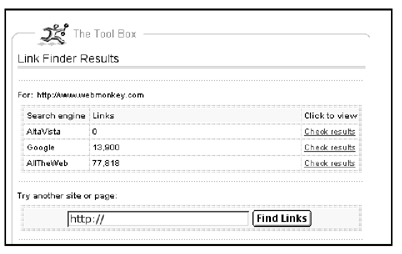linking strategies
| Hyperlinks (or just "links") are one of the defining features of the web. The ability to leap effortlessly from one page to another creates a world of possibilities. Within our own sites, we can link users back and forth between services, we can suggest related products or stories, we can point them toward related web sites, and we can help them find the check-out stand or story archive with ease. We can also confuse the hell out of them. But that's not my point right now. My point is this: Links are important. And every marketing strategy should take full advantage of them. A site's popularity is often proportional to the number of links leading to it. If sites all over the web, and all over the world, are linking to your web site, there's a good chance that people will follow them providing your site with a steady stream of new users. But links don't usually blossom on their own. It's going to take some work on your end to get things going. You may want to start by targeting the five different types of links you can acquire: Types of links:
links from search enginesSearch engines are by far the most important source of traffic for many small sites. If someone out there is looking for a site like yours, she'll probably turn first to a search engine to find it. These general, navigational sites attract a large, mass audience and are therefore the best place to target the largest number of people in one swoop. They're also often the best place to find the right visitors, because they help users find the niche sites they're looking for. Getting listed in search engines is fairly straightforward it's essentially a matter of submitting your site's address. But rising through the ranks so you appear near the top of the list for any given search can be the challenge of a lifetime. See improving your search rank, p. 309.
links from directoriesDirectories like search engines are another big, important source of traffic for small sites. Unlike search engines, however, directories are compiled by hand. So there's a human who decides whether and where your site gets listed. Getting into directories requires a bit more strategy than search engines: You have to choose the appropriate category and write an accurate description. It also helps to pay the expediting fee, which ensures your site will at least be considered. See getting listed in directories, p. 311. links from other sitesSearch engines and portals are important, sure. But they're also hard to break into. Especially if you lack the funds to pay an expediting fee, it can take a long time to even appear on sites like Yahoo! So it's important to also attract links from smaller sites that share your focus. These grassroots links can prove every bit as effective as a listing on one of the big dogs. Now, a smart linking strategy is a focused linking strategy. You should zero in on the sites that are most likely to link to you and most likely to send qualified users. Focus on sites that
To choose the right sites, you need to focus, once again, on your users. What are their interests? What other sites do they visit? Where are these potential visitors who haven't found your site yet? As usual (when on a budget, or even when you aren't), the highly scientific method of, um, guessing should be your first approach. So if you're promoting a recipe site, you need to think about the mentality of the cook. Where can you find her? Well, surely you can find cooks on other cooking sites. But sites that complement yours rather than compete with it are generally more willing to share links. So you could try, for example, gardening sites (Promote your recipes for garden-fresh tomatoes) or party-planning sites (Promote "10 Crowd-Pleasing Punch Recipes"), or sites that sell cookware or gourmet foods. Although guessing is always your best first bet, sites with deep pockets can validate their assumptions about where their users are. Research services, like Nielsen's NetRatings (See p. 246), can determine the approximate overlap in audience between any two sites. Once you've identified a set of sites that your kind of users frequent, half your linking strategy is complete. Now you just need to get on those sites one way or another. There are a few ways you can go about this: One is to join a web ring or link exchange, through which a group of related sites agree to link to each other often using a common navigation bar. Another is to initiate an affiliate program or other incentive program through which sites receive financial incentives to link to you. Alternatively, you can drum up links the old-fashioned way: Ask for them. types of links: top-level and "deep"Assuming you're on a tight budget, your first approach will be to look for free links. There are two basic kinds:
top-level links Top-level links will generally be offered by directory-style sites and the "related resources" page on smaller content-specific sites. The way you get these links is pretty straightforward: You ask for them. Simply email the site owner, explain what your site is about, request a link, and wait. Keep in mind, however, that most free links aren't exactly free: They'll link to you, if you'll link to them. And these lists of links can become quite unwieldy, if you don't manage their appearance and upkeep. It's a good idea to have an out-linking strategy in place before you begin your solicitations.
Bear in mind: Most free links aren't exactly free. Sites will link to you...if you'll link to them. Web Rings are the natural outgrowth of mutual linking strategies. Often, groups of related sites will band loosely together to form a mutually beneficial network. The alliances are usually loose: Otherwise independent sites simply agree to link to each other, sometimes placing a standard button or navigation bar on their sites.
"Web rings are a low cost way to get people to click from one site to another," says Hunter Madsen, principal at H Marketing. "But usually you get what you pay for. My experience is that they don't work very well. People tend not to click on the web ring bars." As the agreements between web rings become more formal, the arrangement might be called a network, as it is in the more corporate web world. Networks of sites may or may not be owned by the same corporate parent, but they generally share some type of navigation scheme, as well as an advertising sales force. deep links The other free linking strategy involves so-called "deep linking," which is less dangerous (and less interesting) than it sounds. Deep linking sends traffic to interior pages on your site, rather than the front door. So a site may be linking to a particular service you offer or a particular product you're featuring. This type of focused linking strategy is the smartest linking strategy. It forces you to think regularly about the content or services your site offers and who might be interested in them. If you've published an article on Apple products, for example, be sure to notify the Apple fan sites and discussion groups. If you have information on, say, rescuing retired racing dogs, then let the people who run Greyhound and Whippet sites know. Also consider permanent partnerships with sites that provide complementary services. If you sell ergonomic keyboards, for example, then perhaps you should be partnering with sites that discuss work-related injuries. Or if you run a catering service in Portland, Oregon, think about partnering with a local florist, and printer so you can cover the whole suite of party-planning needs for Portlanders. headlines on other sitesSometimes, it's a hard sell to get other sites to link to yours. Most large-scale sites aren't interested in simple link exchanges; they're looking for something more in their linking strategies. One of the things most sites are looking for, however, is content. Many sites especially portals are looking for ideas on how to integrate subject-specific content into their sites. Content is valuable: It keeps users on a site longer (rather than just searching and clicking away, as is often done on portals), and equally important it allows them to charge advertisers higher rates, based on premium content. So if you're a specialized content site, you should consider generating headlines (or tips or any other small, bite-size morsels of information) for distribution on larger, more general sites. paid linksIf all else fails or even if it succeeds you may want to bring some paid links into your repertoire. Paid links can be a smart way to enter into advertising, without paying astronomical prices. They're also the best way to place your link exactly where you want it. Although informal deals can be worked out with individual sites, there are several large-scale linking programs in place, including Google AdWords, Overture, and Sprinks. paid links on search engines One of the best ways to spend a small advertising budget is placing text-based ads on search engines, where they can be targeted to specific keywords. These text ads aren't flashy, as ad banners are; they simply inform the user of your site's existence, which is exactly what you need them to do. Search engines with paid links include
paid links on other sites Many other sites accept what are usually called "sponsored links." These can be purchased individually through sites or through a large-scale program, like Sprinks, which uses an auction model similar to Overture's and places links on many different sites. "Don't just stand there email an ambulance!" On the web Paid-link programs Google AdWords http://www.google.com Overture http://www.overture.com Sprinks http://www.sprinks.com |
EAN: 2147483647
Pages: 195

